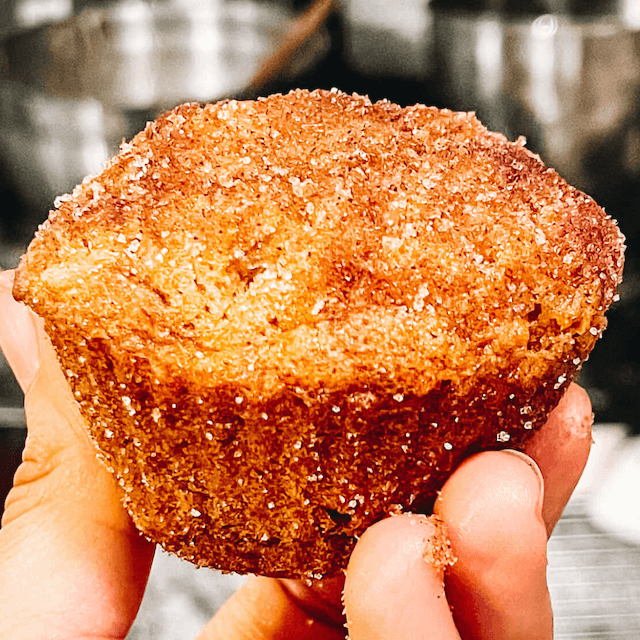Lawn Grass Mulching Benefits from Clippings & Mowing
I will show you all the grass mulching benefits that will work magic in your garden.
This post may contain affiliate links. As an Amazon Associate, I earn from qualifying purchases. Please read my Disclaimer for more information.
Grass mulching is a sustainable gardening practice that offers numerous benefits for your lawn, garden, and the environment, or food forest

I love using my grass clippings as garden mulch by leaving them on my lawn or using them in other areas of my garden.
Grass Mulching Benefits Table of Contents
In this post, I give you plenty of explanations on how there are many advantages of grass mulching, from soil health to water conservation and beyond.
What is mulch?
Mulching is a gardening and landscaping practice that involves covering the soil’s surface with a layer of organic or inorganic material.
This protective layer serves multiple purposes, benefiting plants, soil, and the overall garden or landscape
mulching is a versatile and beneficial practice in gardening and landscaping.
Whether you’re aiming to conserve moisture, suppress weeds, improve soil health, or simply enhance the beauty of your outdoor space, mulch can be tailored to meet your yard needs.
It’s an eco-friendly and sustainable way to promote healthy plant growth while reducing maintenance and conserving the natural resources around your home.

Different types of mulch
Before I give you all the benefits, below are all the types of mulch you can use.
Organic mulches including materials like shredded bark, wood chips, straw, and compost.
They improve soil fertility as they decompose.
Inorganic mulches, such as gravel or rubber mulch, don’t decompose and provide a more permanent solution.
Inorganic mulches like weed barrier fabric or plastic can provide long-lasting weed control.
These materials effectively block sunlight, preventing weed growth and simplifying maintenance.
- Wood Mulch: Derived from shredded or chipped wood, it includes hardwood and softwood varieties. It decomposes slowly and adds nutrients to the soil.
- Bark Mulch: Made from tree bark, it comes in different sizes and colors, enhancing aesthetics while retaining moisture and suppressing weeds.
- Straw and Hay Mulch: These organic options like pine straw are often used in vegetable gardens. Straw decomposes slowly, while hay may contain seeds.
- Grass Clipping Mulch: Fresh grass clippings can be used as mulch to retain moisture, suppress weeds, and add nutrients to the soil.
- Rock and Gravel Mulch: Inorganic options that don’t decompose and are suitable for xeriscaping and arid regions.
- Rubber Mulch: Made from recycled tires, it’s long-lasting, provides excellent weed control, and is often used in playgrounds.
- Leaf Mulch: Composed of shredded or composted leaves, it enriches the soil with organic matter.
- Pine Needle Mulch: Lightweight and acidic, it’s suitable for acid-loving plants like blueberries.
- Cocoa Shell Mulch: Made from cocoa bean shells, it adds a pleasant fragrance but can be toxic to pets if ingested.
- Compost Mulch: Composted organic material enriches the soil with nutrients while retaining moisture.
Choose the type of mulch that best suits your garden’s needs and aesthetics while considering factors like climate, plant types, and sustainability.
Grass mulching benefits
1. Builds Nutrient-Rich Organic Matter

Lawn clippings are a valuable source of organic matter and nutrients.
When you mulch your grass, you return these nutrients to the soil, creating a natural fertilizer for your lawn and garden.
The clippings contain essential nutrients like nitrogen, potassium, and phosphorus, which promote healthy plant growth.
This nutrient-rich organic matter is perfect to place in your compost pile.
2. Will Enhanced Your Soil Health

Grass cuttings contribute to soil health in many ways:
- Grass tiny pieces break down over time, enhancing soil structure and aeration. This allows better root penetration, water infiltration, and the exchange of oxygen and carbon dioxide.
- Grass mulch provides food for beneficial soil microorganisms and can be used as lawn fertilizers.
- These microorganisms break down the clippings, further enriching the soil with nutrients and improving its overall health.
- A layer of mulch clippings helps prevent soil erosion by protecting the soil surface from heavy rainfall and wind.
3. Reduces Weeding

Use grass mulching as a natural weed barrier is the best way to reduce weeds.
The mulch layer prevents weed seeds from coming into direct contact with the soil, reducing weed germination and growth.
This reduces the need for time-consuming and environmentally harmful weed control methods. Home gardeners should place mulched grass clippings flower beds or any garden beds.
4. Saves you Water

One of the significant benefits of grass mulching is its ability to conserve water:
- Improved Water Retention: Mulched lawns and gardens retain moisture more effectively. Yard trimmings help the soil retain water, reducing the frequency and volume of irrigation required.
- Reduced Evaporation: A mulch layer reduces evaporation from the soil surface, keeping the soil consistently moist for longer periods.
- Drought Resistance: Grass-clipped mulched lawns are more resilient during periods of drought, as they retain moisture better.
5. Reduce & Control of Lawn Thatch
Thatch is a layer of dead grass and other organic matter that can accumulate on the soil surface.
While some thatch is normal, excessive thatch can inhibit water penetration and nutrient absorption.
Grass mulching encourages the decomposition of thatch, preventing its buildup.
6. Will Save you Money

Grass mulching can save you money in several ways:
- Reduced Fertilizer Needs: Because grass clippings are a natural source of nutrients, you may need to use less synthetic fertilizer, saving on fertilizer costs.
- Less Yard Waste: Grass mulching reduces the volume of yard waste you need to manage, potentially lowering disposal costs or reducing the time and effort spent on yard cleanup.
- Water Savings: With improved water retention, you may use less water for irrigation, leading to lower water bills.
7. Saves you time

Grass mulching simplifies lawn care and reduces the time you spend on maintenance:
- No Need to Bag Clippings: Mulching eliminates the need to collect, bag, and dispose of grass clippings after mowing, saving you time and effort.
- Faster Mowing: You can mow your lawn more quickly because there’s no need to stop and empty a grass catcher.
- Fewer Fertilizer Applications: Grass mulching reduces the need for frequent fertilization, saving you time spent on applying and spreading fertilizers.
8. Reduced Environmental Impact
Grass mulching aligns with sustainable and eco-friendly gardening practices:
- Lower Carbon Footprint: Reducing the need for synthetic fertilizers and frequent lawn mowing can reduce greenhouse gas emissions associated with lawn care.
- Decreased Chemical Use: By using fewer chemical fertilizers and pesticides, you minimize the environmental impact of these substances.
- Reduced Green Waste: Fewer yard waste collections mean fewer greenhouse gas emissions from transportation and disposal.
9. Makes you Lawn Healthier

Grass mulching promotes overall lawn health:
- Thicker Turf: Over time, smaller pieces of grass mulching encourages the development of a thicker, healthier lawn with improved resistance to pests and diseases.
- Reduced Stress: Consistent moisture levels and aeration provided by mulch help reduce stress on the grass, making it less susceptible to drought and heat stress.
- Balanced Growth: Grass mulching provides a steady supply of nutrients, promoting balanced and sustainable grass growth.
10. Improved Aesthetic Appeal
A healthy lawn can look lush and well-maintained.
The consistent green appearance of mulched grass clippings of an inch can enhance the visual appeal of your yard.
11. Benefits Insect & Wildlife

Grass mulching can benefit local wildlife and insects:
- Insect Attraction: The presence of mulch can attract beneficial insects like earthworms, which improve soil health, and pollinators like bees and butterflies.
- Wildlife Habitat: Grass mulch provides shelter and foraging opportunities for small wildlife, contributing to biodiversity in your garden.
12. Sustainable Lawn Care
Grass mulching aligns with sustainable landscaping principles by reducing waste and minimizing the use of synthetic chemicals.
It’s an eco-friendly approach that conserves resources and supports a healthier environment.
13. Educational Opportunity
Practicing grass mulching provides an educational opportunity for both adults and children.
It demonstrates the importance of sustainability, soil health, and the natural processes that govern plant growth.
It can also serve as a valuable teaching tool for gardening and environmental education.
The Science Behind Mulching

Mulching is grounded in several scientific principles that make it an essential practice in gardening and agriculture.
1. Mulching creates a protective layer on the soil’s surface, which reduces evaporation.
This physical barrier prevents direct sunlight and wind from drying out the soil.
By reducing water loss through evaporation, mulch helps maintain soil moisture levels, ensuring a consistent supply of water to plant roots.
This is particularly critical in arid and dry regions.
2. Temperature Regulation insulating properties of mulch extend to temperature regulation.
In hot weather, mulch keeps the soil cooler by blocking excessive sunlight and reducing heat absorption.
Cold weather acts as an insulator, preventing rapid temperature fluctuations that can harm plant roots.
Maintaining a stable soil temperature is vital for plant health and root function.
3. Weed Suppression created from mulch serves as a natural weed barrier by blocking sunlight from reaching weed seeds or existing weed plants.
Weed seeds need sunlight to germinate, so when they’re deprived of it, their growth is inhibited.
This reduces weed competition for nutrients, water, and space, sparing desirable plants from competition and reducing the need for herbicides.
4. Soil Health from organic mulch, such as wood chips or compost, break down gradually over time.

During decomposition, they release valuable nutrients into the soil.
This enriches the soil with essential elements like nitrogen, potassium, and phosphorus, providing natural fertilization to plants.
Additionally, mulch supports beneficial microbial activity in the soil, improving soil structure, aeration, and nutrient availability.
5. Erosion Control from mulch acts as a protective blanket for the soil, preventing surface runoff during heavy rainfall or wind.
By reducing soil erosion, it safeguards against the loss of valuable topsoil and the exposure of plant roots, which can lead to stress and damage.
6. Reduced Compaction from mulch helps prevent soil compaction, especially in high-traffic areas.
By serving as a protective layer, it mitigates the compaction caused by heavy equipment, foot traffic, or rainfall impact.
This preserves soil structure and aeration, promoting healthier root development.
7. Pest and Disease Management is improved by certain mulches, such as cedar or cypress, which have natural properties that deter pests and pathogens.

Additionally, by maintaining consistent soil moisture levels, mulch can help prevent some plant diseases that thrive in excessively wet or dry conditions.
Mulching is a scientifically grounded practice that leverages principles of soil science, biology, and ecology to enhance plant health and optimize gardening and farming outcomes.
By creating a protective and nurturing environment for plant roots and soil ecosystems, mulching contributes to sustainable and productive landscapes while minimizing the need for synthetic inputs and chemical interventions.
Conclusion
Grass mulching offers a wide range of benefits for your lawn, garden, and the environment.
From enhancing soil health and conserving water to reducing costs and promoting biodiversity, grass mulching is a sustainable and eco-friendly approach to lawn care that contributes to the long-term health and beauty of your outdoor spaces.
More gardening tips are posted below
Soil Blocking: The Ultimate Guide for Beginners
25 Fruits & Best Vegetables for Vertical Gardening
How to Start a Vegetable Garden from Scratch for Beginners
PIN FOR LATER

Don’t forget to spread the ❤️ Love & Share this Post!






